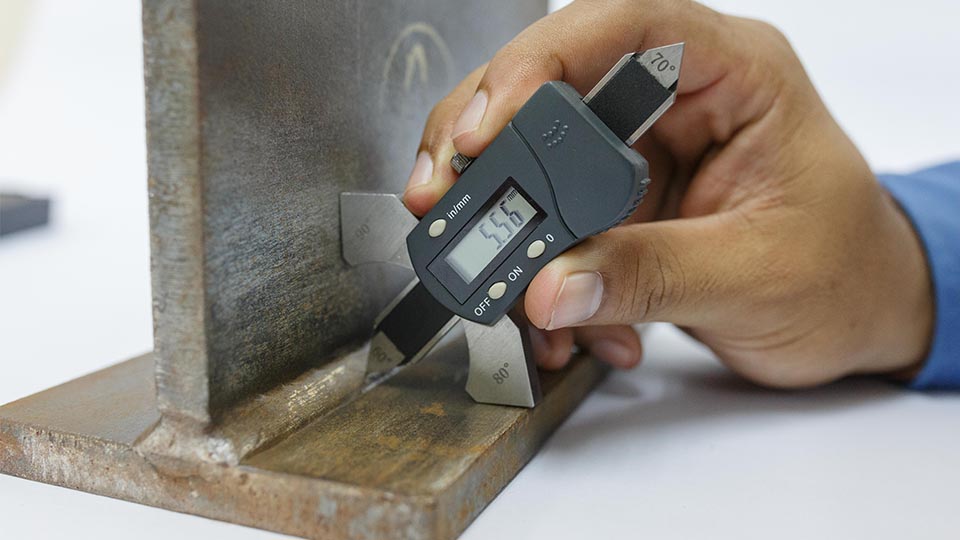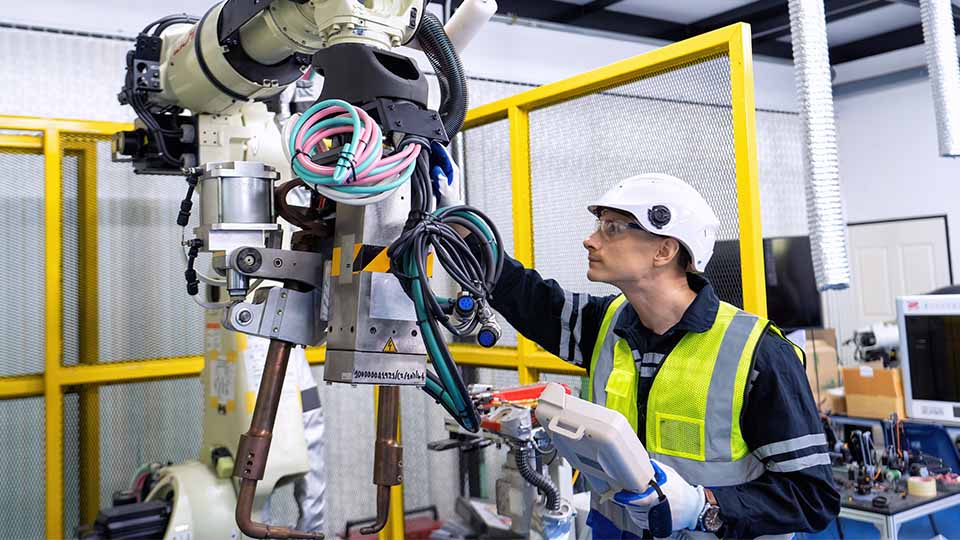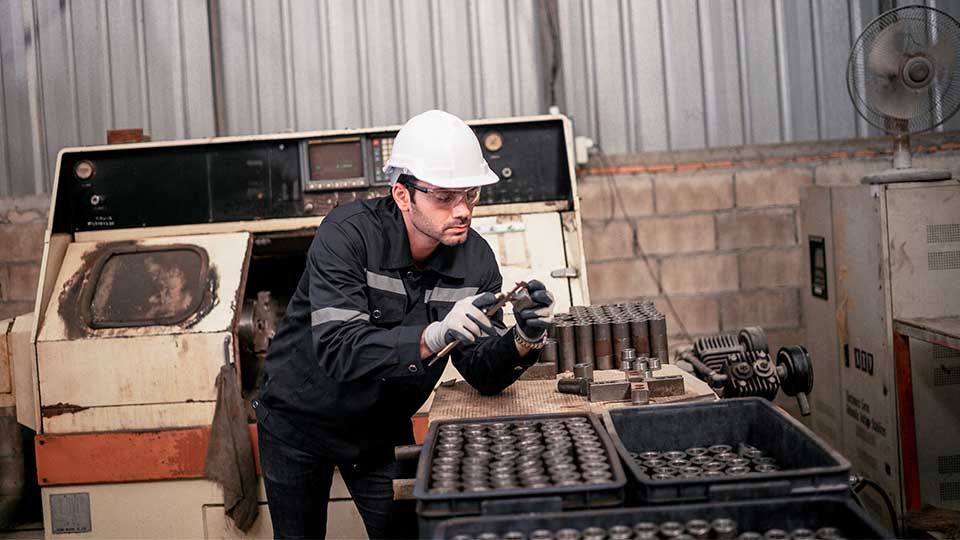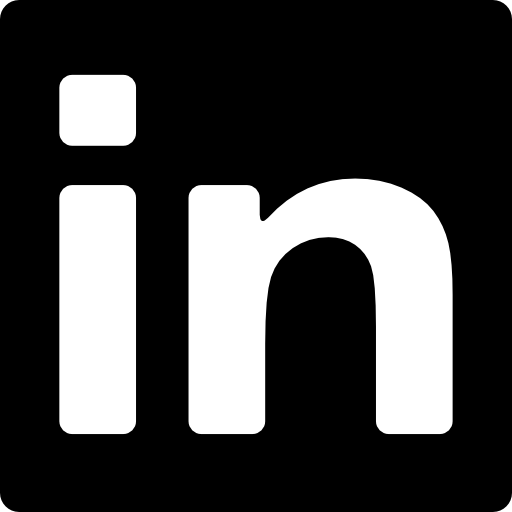When in-house teams hit a roadblock, they bring in experts who can bridge the technical skills gaps within their organization. In this in-depth guide, we’ll dissect the role of an engineering consultant, what they do, how to become one, and how to find the right consultant if you’re a company looking for one.
What is an engineering consultant?
An engineering consultant is an experienced professional who offers expert advice and solutions in the engineering field. Engineering consultants are often brought on board by businesses or agencies who need help with technical problems, streamlining processes, or overseeing projects.
With their specialized know-how and experience, these consultants zero in on streamlining operations, meeting regulatory must-haves, and charting a path to innovation, all aimed at long-term success. From blueprint to build, from code to commerce, their expertise is called upon in industries as diverse as construction, manufacturing, defense, energy, food and beverage, and technology.
For example, manufacturing projects get a whole lot safer when they’re involved, which guarantees that products and systems meet the highest standards. In manufacturing, they could be optimizing processes to improve inefficient production lines and reduce costs. And in the manufacturing sector, they might work on projects related to robot integration, new automation equipment, or improving the efficiency of existing automated systems.

What do engineering consultants do?
It’s easy to understand a general view of how engineering consultants work, but let’s take a deeper look into what they actually do. Below are some of the key tasks these engineers typically do.
Problem-Solving:
Engineering consultants are like the detectives of the engineering world. When a client has a technical issue, the consultant digs deep to understand what’s going wrong. Data collection is just the beginning—to get the full picture, they scrutinize design documents, conduct rigorous site inspections, and run exhaustive tests.
Project Management:
An engineering consultant can help their client’s in-house teams run projects smoothly from start to finish. They keep everything on schedule and within budget by coordinating with various other engineers, production, and upper management. This ensures everyone is on the same page and working toward the same goals.
Plus, they work on optimizing resources by squeezing the most out of every scrap of material, worker, and machine. They also anticipate problems and try to stop potential overspending before it’s too late.
Technical Advice:
Engineering consultants offer expert recommendations on a wide range of technical matters. For a project that is both durable and cost-conscious, they’re here to lend a hand in choosing the ideal materials. By tapping into their technical expertise, you’ll avoid costly missteps and shortcut your path to project success.
Quality Requirements:
Making sure projects comply with the required specifications and regulations is a big part of an engineering consultant’s job. They cover all the bases by rigorously screening rules and guidelines, so you don’t have to worry about them.
This means staying up-to-date on the latest specifications that could impact the project, whether it is engineering standards or customer specifications. They review and audit project plans and processes thoroughly to find any compliance issues early on in the project.
If they find any problems, they work with the project team to fix them quickly and suggest changes or improvements to meet the quality requirements. This kind of proactive approach helps avoid legal troubles, which keeps the project on track and helps maintain project credibility.
Design & Analysis:
These consultants often handle the design and analysis of systems, structures, or products. Ideas get hashed out through elaborate spreadsheets, guided experiments, and methodical forecasting–all to determine whether their visions are tangible realities.
This might involve using advanced software tools and tech expertise to come up with designs that meet the project’s goals and requirements. These engineers can recreate a virtual test environment through simulations, which allows them to isolate and eliminate potential issues upfront, so what you’re left with is a design that’s fast, affordable, and thoroughly safety-tested.
Efficiency Improvements:
Many companies turn to engineering consultancy to make processes and systems run more smoothly. Consulting engineers aim to increase efficiency, cut costs, and upgrade performance, which can involve everything from redesigning a manufacturing process to implementing new software tools.
Focusing on everyday operations, they figure out where improvements can be made and then work up strategies to get more done in less time. Whether it’s new automation, process improvements, or innovative approaches, the end goal is always smoother, more agile operations.
Training & Development:
Engineering consultants often provide training and support to a client’s staff to help them understand new systems or technologies and how to use them effectively. For example, in robotics consulting, they might train existing staff on how to operate and maintain advanced robotic systems.
Risk Management:
Spotting potential risks or failures and figuring out how to prepare for them is another big part of what engineering consultants do. Whenever a project kicks off, they start scanning for vulnerabilities, meticulously examining every facet – from mechanical designs to material choices, timelines, and even outside variables that could throw a wrench in the works.
By anticipating possible issues, they can come up with plans to tackle them before they become major problems that can lead to unexpected downtime in manufacturing.
For Engineers: How to become an engineering Consultant?
Becoming an engineering consultant can be a rewarding career. For one, it gives you the chance to work on a variety of long and short-term projects and offer expert advice. But how to do it and which skills do you need?
Steps to Becoming an Engineering Consultant:
If you want to be a consultant, here are eight straightforward tips to help you get started:
1. Get the Right Education:
Start with a relevant engineering degree, whether it’s mechanical, electrical, systems engineering, or another bachelor’s degree in engineering that interests you. Before you start your consulting career, lay the groundwork with a solid education. You’ll gain the technical expertise and critical thinking skills that put top consultants apart from their peers.
Make sure to choose a program in an industry that shows signs of career growth. While you’re in school, take advantage of internship programs and co-op opportunities to gain hands-on experience and start building your professional connections through platforms like LinkedIn.
Courses in business management or communication classes can also be helpful since consulting involves more than just technical expertise!
2. Gain Work Experience:
Spend several years working in your chosen field and get as much hands-on experience as possible to build your technical knowledge and skills. Cast a wide net by taking on projects that slice across different areas of your specialty. It’s the best way to grasp what you’re capable of truly.
With each new experience, you’ll gain a better sense of what interests you or what leaves you feeling dissatisfied in the industry so you’ll know when you are onto something that you truly want to pursue.
Volunteer for stretch assignments and take the reins on projects that challenge your technical background and prior assumed knowledge. This is a great way to demonstrate your capabilities and showcase your leadership skills. Once you’ve worked in the industry trenches, you’ll have the street smarts to conquer the challenges that consultants face every day on the job.
3. Earn Certifications:
Consider getting certifications like PE (Professional Engineer), Certified Welding Inspector (CWI), or other industry-specific credentials because these certifications will boost your job credibility and attract new clients. Certifications show client that you are commitment to the profession and your expertise in specific areas of engineering.
For example, the CWI is a sign that you’ve satisfied strict education and experience requirements while also upholding the welding codes.
Supplement your experience with certifications in specialized areas like project management or technical fields to gain a professional edge, as it can make all the difference in your job search.
4. Develop Soft Skills:
Communication skills are all must-have soft skills regardless of what industry you’re in. You’ll need to “dumb down,” technical jargon for clients who don’t understand or may not have the same technical background. Imagine sitting across from a potential client, armed with the perfect solution to their problem. But if you can’t articulate your plan and its benefits, that solution might as well not exist.
Additionally, strong problem-solving skills enable you to tackle the diverse challenges you’ll encounter as a consultant. Being organized and having project management skills help you keep projects on track so that they are completed on time and within budget.
5. Networking:
Think of your professional network as a launching pad for your engineering consulting career because the more connections you make, the more possibilities open up to find work. Join professional organizations related to your engineering discipline, as these groups often provide valuable networking events, resources, and certification opportunities.
Don’t be shy about reaching out to senior consultants and potential clients through social media platforms like LinkedIn. Building these online relationships can lead to collaborations, referrals, and valuable advice.
6. Market Yourself:
Create a professional website and create a LinkedIn profile showcasing your expertise and experience. Your professional online identity should shout out your skills, flaunt your past achievements, and proudly display any certifications you’ve earned.
Sharing your work expertise through indudsrty realated blog posts or articles on a website can swiftly build your reputation as a thought leader in your industry. As you gain experience, try giving talks at conferences, webinars, or podcasts to improve your reputation.
Harness the power of real-life success stories and firsthand endorsements from satisfied clients to showcase your achievements. This can be very effective marketing that will set you apart from your peers and attract new potential clients.
7. Start Small:
If possible, begin your consulting career by taking on small consulting projects while still working in your current job (if you have one). This way, you gain experience and build a portfolio without the financial risk of going full-time immediately.
Look for job opportunities with your current employer or through freelance platforms like JOINER Services.
Small projects can help you develop your consulting skills, learn how to manage client relationships, and understand the business side of the consulting industry. Compile these stories into testimonials and case studies that effectively market your skills to potential clients.
Starting small also gives you the flexibility to learn and quickly adapt without the pressure of relying solely on your consulting income.
8. Go Full-Time:
Once you have enough experience and a solid client base, you can transition to full-time consulting. Before you launch your business, get your ducks in a row by outlining your professional services, ideal customer, pricing structure, and marketing tactics.
More importantly, understand the financial aspects of running your own consultancy agency, such as managing cash flow, setting aside funds for taxes, and covering business expenses. Stepping into full-time freelancing means constantly hustling for new clients and projects to keep your business afloat.
To stay ahead, prioritize networking, self-promotion, and exceptional work quality to build a rock-solid reputation so your clients keep asking for your support.
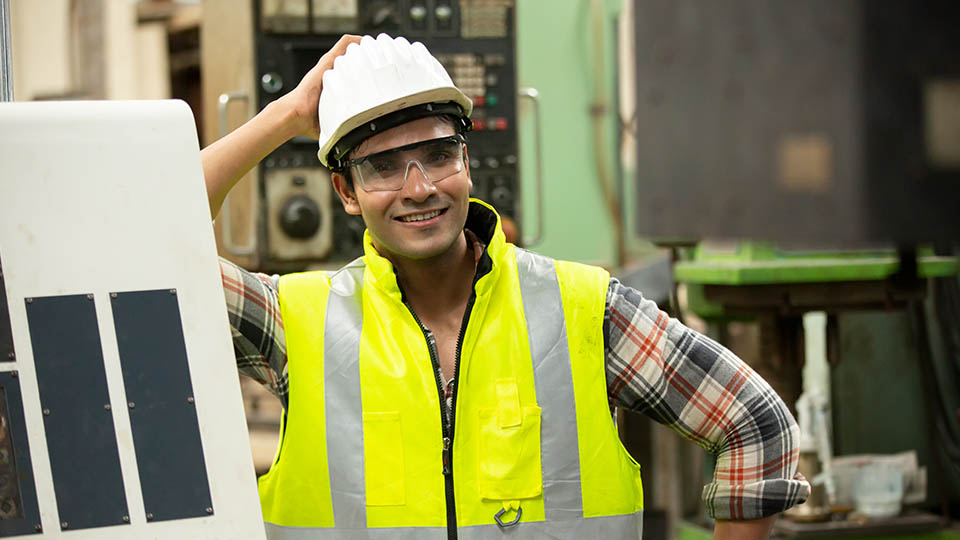
Engineering Consultants Must Know Essential Hard & Soft Skills:
To succeed as an engineering consultant, you’ll need a mix of technical knowledge (hard skills) and interpersonal abilities (soft skills). Strike a balance between solving problems and working well with clients because that is a winning combo for long-term success in the industry.
Here’s a breakdown of the essential skills every contractor should focus on:
Hard Skills:
- Technical Proficiency: Of course, you need a solid grasp of your engineering field. To stay ahead in your engineering specialty, you need to keep your skills sharp with the latest technologies and methods. This means being up-to-date on the newest engineering advancements and the latest technologies in your specific industry.
- Project Management: It is important to plan, execute, and oversee projects. Every contractor must manage the project timeline to meet the financial requirements, which is key to successful project delivery.
- Data Analysis: You should be able to analyze and interpret complex engineering data to make informed decisions. Using analytical tools and software is great for clients to see, so providing examples of your experience in reviewing data is something you would want to showcase.
- Design and Simulation: Creating detailed designs and being able to run simulation tests is also essential to highlight. Being able to show what deisgn tools (AutoCAD, SolidWorks, Inventor) or other software that you have used in various engineering fields to create models and test designs before they are implemented is something you need to know how to do on certain contract jobs.
- Code Book Knowledge: Knowing and keeping up with client specifications and code books that impact your project is another important skill. This ensures all your work complies with technical standards and helps avoid potential quality issues.
Soft Skills:
- Communication: You will need to explain complex technical concepts in simple terms to clients and other team members who might not have the same technical background as yourself. Good communication also involves listening well and being able to write clear reports, proposals, and explain what is required to complete a project.
- Problem-Solving: Effective problem-solvers share a common trait which is the ability to slice through confusion, pinpoint issues, and suggest a realistic fix that addresses the underlying concerns.
- Adaptability: Having the ability to adjust to new challenges, different technologies, and work environments is important. Consulting often involves working on unique projects and running into unexpected issues, so being adaptable helps you stay effective and relevant.
- Interpersonal Skills: The secret to long-term success in the consulting industry is that you will need to build genuine relationships with your co-workers. Your client and their team members need to feel like you care as much about the success of the project as they do.
- Time Management: Engineers must efficiently manage time and prioritizing tasks, meaning you meet deadlines and handle multiple tasks effectively.
- Learn: You must also be willing to learn new things from your client. You should strive to grow your knowledge while on every new job.
Salary For Engineering Consultants:
Salaries for engineering consultant jobs can vary quite a bit depending on experience, location, and industry. If you’re just starting your engineering consulting career, you can expect to make between $50,000 and $80,000 a year. For every new job you complete and the more experience you gain, your paycheck will grow a little bigger.
Mid-level consultants typically earn between $75,000 and $175,000 annually, while senior consultants with lots of experience and a solid track record can have an average salary of $150,000 or more. In some cases, highly specialized consultants working on large or critical projects might earn even more.
Also, if you’re working in a high-demand industry or in a major city, you might command higher rates. Independent contractor engineers or those who run their own engineering consulting firms also have the potential to earn more, depending on how well they attract and keep clients.
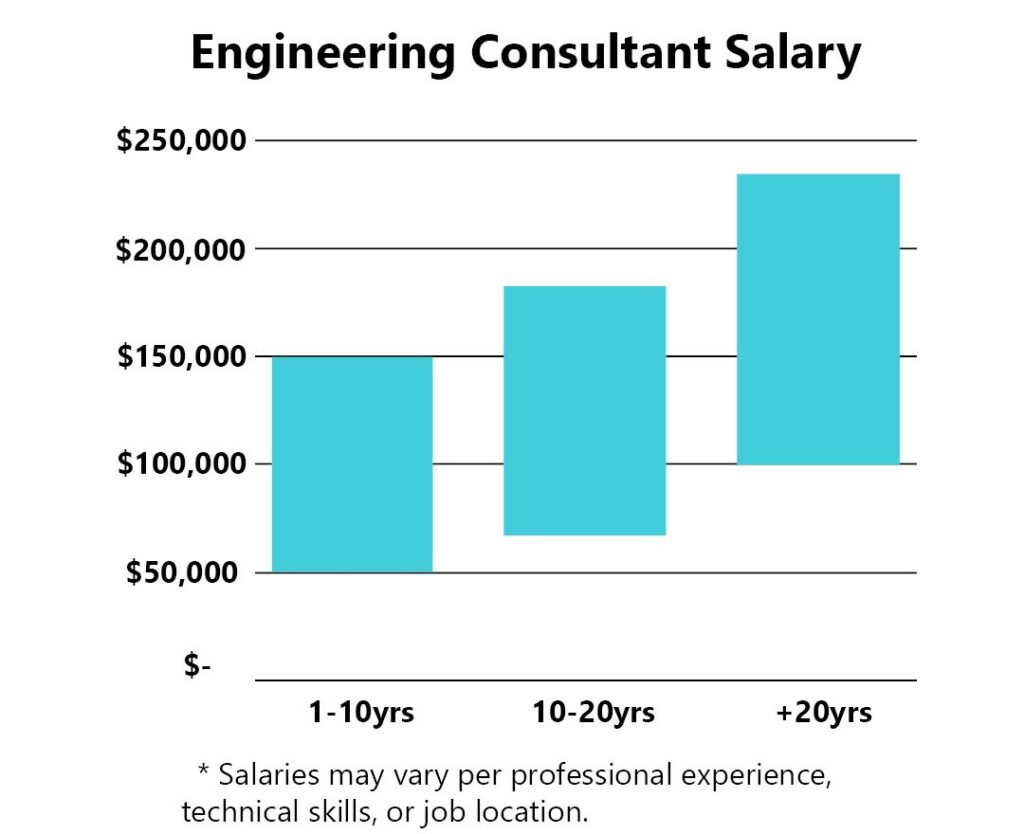
For Clients: How to find the right consulting engineer?
If you’re reading this as someone looking for tips on finding engineering contractors, I have some advice for you. Finding the right consulting engineer can make a huge difference in the success of your engineering projects.
So, here are some tips to help you choose the best one for your needs:
Verify Qualifications:
Make sure the consultant has the right educational background and any certifications that are required for the job. Look for degrees and certifications that are relevant to your engineering fields. These credentials ensure they have developed the basic technical know-how needed for your project.
Certifications in specific areas, in programming or specialized technical skills, are also a big plus. Look up their credentials and check them against the official standards set by their industry’s leading bodies. That would be the best way to get a sense of that persons expertise.
Review Experiences:
The proof is in their portfolio. That’s why it is critical to look into the consultant’s experience before making your choice. Select an engineer who has a proven track record in your specific area of need. Get them to walk you through their previous jobs and look for any parallels that you might have with your own project.
More experienced consultants often have the skills of anticipating problems and creating clever solutions to fix them from leaning on prior projects.
Ask For References:
Get references from previous clients and read online reviews to gain insight into the consultant’s reliability, work ethic, and the quality of their work. Reach out to their prior clients, who can provide valuable insights from their prior time working with the consultant.
These past clients can tell you important things like: Was this person a good team player? Do they engage with the team so they enjoy the job? Are they prepared to do the work? Do they follow safety protocols?
Surfing through online reviews of engineering contractors on professional networking sites like JOINER Services can also give you a more well-rounded view of a consultant’s reputation.
Assess Their Communication Skills:
The right consultant will be able to explain complex engineering concepts in a way that can easily be understood by all parties involved. They should also be good listeners and take the time to understand your specific project needs.
During your initial meetings, pay attention to how well they communicate and whether they make you feel heard and understood. Clear and effective communication ensures that all parties involved are on the same page, which helps to avoid misunderstandings later.
Evaluate Their Problem-Solving Skills:
Engineering projects often come with many unexpected challenges. A good consulting engineer should have strong problem-solving skills and a creative approach to overcoming many different types of obstacles in the workplace.
Dig into their past experiences and find out what were some difficult situations they’ve navigated, and what new and bold strategies did they use to complete the project. If they answer this to your satisfaction, you will gain real peace of mind knowing they can handle any project hurdles that come their way.
Consider Cost vs. Value:
While it is important to consider the cost of hiring a temporary consultant, it may not be in your company’s best interest to go with the cheapest option.
An experienced and skilled consultant might charge more but can save you money in the long run by delivering better results, bringing more industry experience, and avoiding costly mistakes. Before signing a contract, scrutinize each contractor’s strengths and weaknesses, and make sure to understand their full body of work.
Look The Good Fit:
Finally, choose a consultant who will mesh well with your team and project culture. A good working partnership is like the oil that keeps the engine running smoothly. It is the foundation upon which the entire project is built, and without it, things can quickly go off the rails.
Your consultant should be someone who genuinely gets your company, understands your needs, has experience within your engineering industry, and someone you trust to make the right decision during difficult times.
If you want a successful partnership that truly flourishes, you need to make sure this equation is just right!

When do I need to consult with a contract engineer?
Below, I list five great reasons why consulting with a professional engineer can be a smart move for your project. If one or two of these situations apply to you, it might be time to hire a temporary contract engineer.
If you need someone to bring specialized knowledge:
Professional contract engineers bring specialized knowledge and expertise that might not be available in-house with the current team. Whether you’re dealing with quality issues, advanced automation, or new installation of equipment, a contract engineer can provide the insights needed for your company to make informed decisions.
If your efficiency is lacking:
Consulting with an experienced engineer can help streamline your project and save the company time and money. They can identify inefficiencies in production lines and suggest improvements to boost productivity and reduce costs.
If you need someone to manage risks:
Bring in a specialized consultant when integrating new equipment, trying new workflows, or any other situation where you’re facing more risks than usual is very common. These engineers can identify issues and devise clever workarounds to reduce potential risks. With their help, companies can spot potential roadblocks and recommend strategies to sidestep or soften their overall impact.
Sometimes, when companies try to manage this alone, it can turn out very bad. The smallest mistakes made internally can cause major financial trouble for the company. Fortunately, engineering consultants are there to help safeguard your project and prevent minor missteps from snowballing into a costly catastrophe.
If you need someone to add credibility:
Hiring a temporary engineer will add credibility to your project. The moment they become involved, a sense of security can help settle the room, knowing someone has done this type of project in the past. As the client’s teams see the improvements that the contract engineer has contributed to, the confidence of those involved know they can listen to and accomplish tasks proposed by the contractor.
If you need help solving complex problems:
Engineering projects often involve complex technical challenges that require expert problem-solving skills. Engineering consultants have the training and prior work experience to tackle these types of engineering challenges effectively.
Engineering Consulting Services:
Engineering consultant services can streamline and help improve a company’s engineering projects. Using a strategic consultant who aligns with operational needs to support and reduce risk is an integral part of the success of your project.
Working with the right engineering services company can make all the difference. Having a company who can provide highly qualified people with the right engineering skills needed for your project is key. Having a contract engineering services partner who can provide your team with pre-screened engineering staffing resources is so beneficial to the growth or support of any company, even if they are only used on a temporary basis.
If your company is looking for consulting services, JOINER Services provides engineers and technicians for the industrial automation industry who can help with any phase of your project.
Find the best engineering consultants on JOINER Services!
Are you an engineering consultant looking for a new challenge to take on? Or are you a business needing someone to solve a problem for you without a long-term commitment?
Either way, JOINER Services is the right place for you. With the JOINER platform, contract engineers can connect with businesses, and vice versa.
The best part? It’s much easier to find contractors or contract jobs than poring through job board websites or asking for quotes from dozens of engineering companies.

Join today and create your free profile!
FAQs About Engineering Consultants
Below, I list some common FAQs about engineering consultants.


